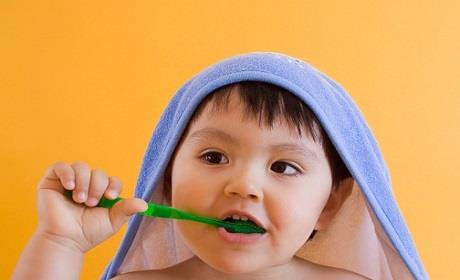In addition to personality training, helping your baby build a clean and tidy accommodation habit is just as important. Children are carefree and do not have much awareness about right and wrong actions, so their current lifestyle is a reflection of their parents' lifestyle.
If your child is very messy, sloppy at home, rummaging through books and looking for belongings before going to school or "carelessly dirty" while playing with friends at school. The baby arrived home, sweaty and sweaty, and with her hands soaked with dirt she hastily picked up a plate of fruit she was ready to sip.
If you accept these things over and over again every day because you think "children are innocent" or "grow up will know", then it is time to change your opinion. Just by the simple, the child's mess, the mess reflects an organized mind, poorly arranged and makes the baby spend more time searching for things.
The mess not only comes from the routine but can lead to the baby "messing" up when handling work later when growing up. As for the disease corollary from infection, not keeping clean hygiene is probably a problem everyone knows.
But how to practice orderliness and hygiene from a very young age? Some of the following suggested methods will help parents to have more choices in how to teach their children.
Build from the home
way of life and lifestyle of parents has a great influence on children. Children simply follow and record information, unconsciously form awareness and follow in a natural way. If you want your child to be tidy and tidy, parents must first of all be neat and tidy in arranging houses and furniture.
For example, if you want your baby to have his or her cup eaten after eating, face it in the cupboard, take the utensils to leave the old position, you should tell them clearly and absolutely follow them, without exception. If your baby makes a mistake, don't fix it for him or her, but tell him to finish it.
For hygiene, you should always ask simple "if so" statements such as: "If you haven't washed your hands, don't eat yet", "If your clothes aren't folded, you can't go out" ... It is important that you let your baby do everything by himself and only assess the end result.
Your baby will realize that, if they just do it through the speaker, sloppy, they will have to do it again, it takes more effort and time. From there, the baby will gradually develop a sense of doing things well the first time, quickly and using reasonable time for other things.

Want to teach good children, besides discipline, also need praise
The sound of "No" accompanied by the explanation "Take your
children properly" is advice that never goes out of style for parents. Once you have let out “No” to your child's permanent taps or asked for exceptions, take it as your final decision and include an explanation why your baby cannot do so. Remember, it must be an explanation, not the imposition of parental authority.
If your baby is crying, nagging, or nagging, you should ignore him temporarily so he can calm himself down. The words of affection, love, and comfort should be left at another time. When your baby sees that the "weapon of nag" has been ineffective, he will stop crying and think about what to do right.
You and your baby can play a game of "scientific research" to find out how bacteria multiply and attack the body of sick people. Explain in the easiest way to prevent disease, the importance of good hygiene.
If your baby is naturally received information over and over again, understands and witnesses the work of his parents, he will also train himself to be hygienic and tidy.












